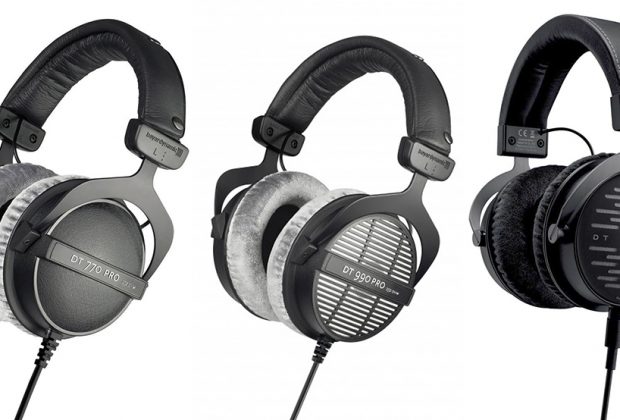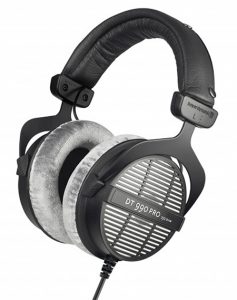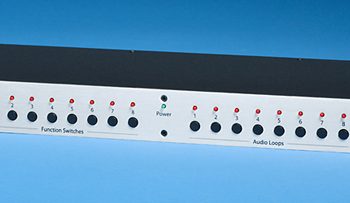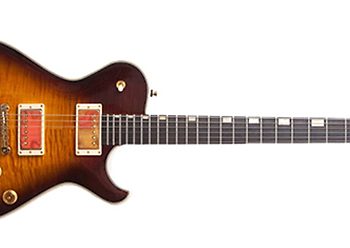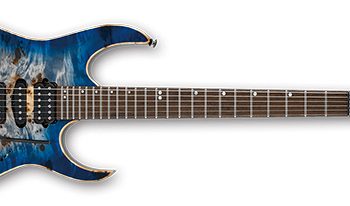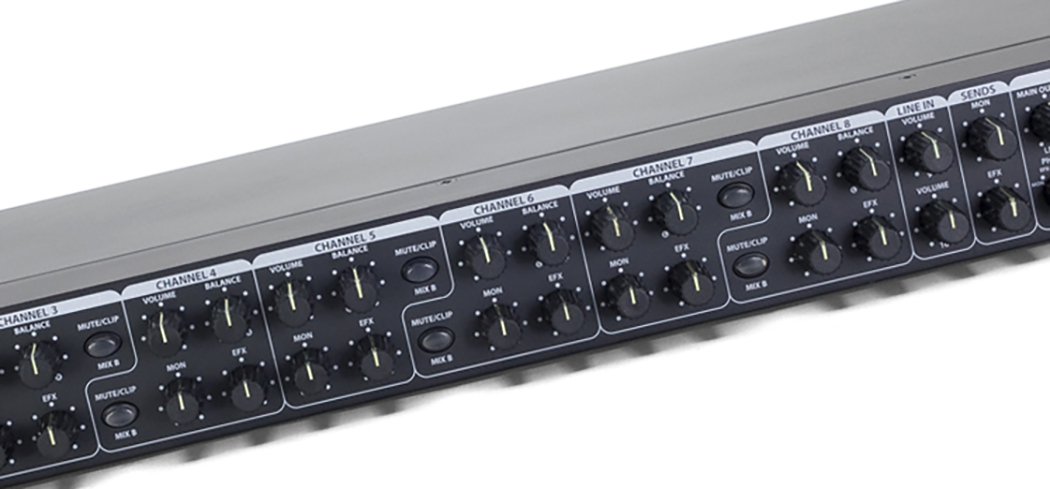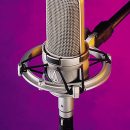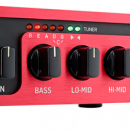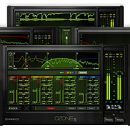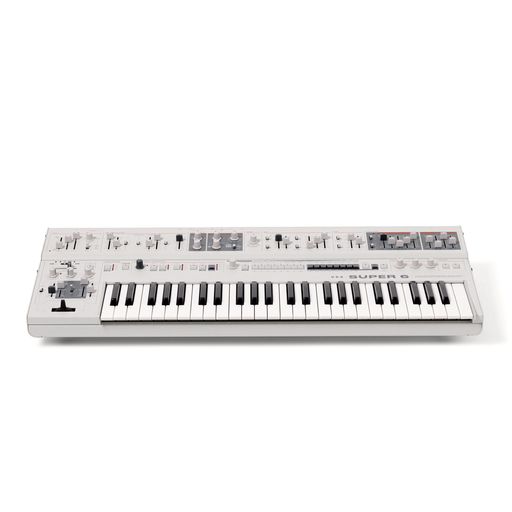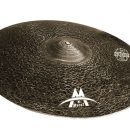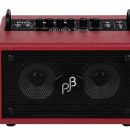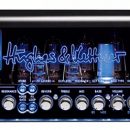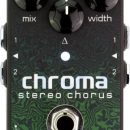Everyone needs at least one decent set of headphones for the studio, whether it’s a closed-back set used while tracking acoustic instruments or an open-back set used for mixing. Beyerdynamic makes a wide range of headphones suited to either task, and we recently had the opportunity to review three solid choices from the DT range, plus a set of outstanding gaming headphones that our nine years old, associate gaming editor declared to be the best sounding headphones he ever used with his Xbox One (though truthfully, he doesn’t have as many years of experience reviewing gear as the rest of us).
For basic tracking needs, the Beyerdynamic DT 770 Pro are a decent choice, providing good sound isolation without significant bleed, a comfortable fit, and good audio quality. You don’t want to track with the DT 990 Pro or DT 1990 Pro models as their open-back design would bleed far too much audio content—at least when in close proximity to a studio condenser microphone. But their design and higher-end audio specs make them well suited to the mixing task. The DT 1990 Pro take top honors as their extended high-frequency response lets you really hear the “air up there” in your mixes, but you do pay a bit more for that additional level of audio detail.
Features
The made-in-Germany Beyerdynamic headphones in the DT series share a similar design form across the range, with a solid, spring steel headband, and aluminum end pieces that attach to the circumaural (around the ear) ear pads. The design prevents the headphones from being folded up into a smaller footprint, but we appreciate that in the studio, this design makes for a less flimsy solution.
All of the headphones feature velour covered, foam ear pads. We tested the following models:
| Frequency Response | SPL | Cable | Weight | |
| DT 770 Pro | 5Hz—35kHz | 96 dB | Straight, attached | 270g |
| DT 990 Pro | 5Hz—35kHz | 96 dB | Coiled, attached | 250g |
| DT 1990 Pro | 5Hz—40kHz | 102 dB | Coiled and Straight included, detachable | 370g |
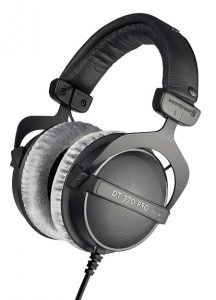
DT 770
With a closed-back design, the DT 770 Pro is a go-to headphone for tracking musicians in the studio. Designed for a variety of uses both in and out of the studio, the DT 770 Pro is available in your choice of impedance: 32 ohms for use with laptops and smart phones, 80 ohms for general purpose studio use, and 250 ohms for high-end studio use. The straight cable is extra-long for easy use in the studio, but is not detachable. It includes a drawstring bag.
Stepping up to the DT 990 Pro gets a more rugged construction, though it shares the family design characteristics. These are an open-back design, targeted at mixing and critical listening tasks, but not tracking (unless bleed isn’t an issue, such as recording direct instruments). They share similar audio specs as the DT 770 Pro. Again, the cable is not detachable, but given the different intended use, these features a shorter, coiled cable. They are rated at 250 ohms, and also include a drawstring bag.
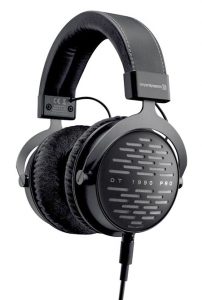
DT1990
The high-end DT 1990 Pro headphones are more advanced in a few ways. The first is found in the audio specs, capturing more high-end, the result of its 45mm Tesla neodymium driver. Next, the ear pads are not only detachable, but the headphones include two different sets: one optimized for neutral response, the other for a “well-balanced” response. And finally, the cable is a studio friendly, detachable mini-XLR type. The headphones include both a coiled and a straight cable. They are rated at 250 ohms, and include a semi-rigid storage case.
Each of the DT series headphones cables featured gold-plated 1/8” connectors plus ¼” screw-on adapters.
Usability
All three of the headphones reviewed were of sufficient build quality, with the 990 Pro and 1990 Pro feeling a bit more premium. The closed-back DT 770 Pro were just a bit more plastic-y to the touch.
The headphones were all very comfortable to wear. Their light weight, soft padding over the head, and soft ear cups all came together for a great user experience. The ear cups were also good at not building up heat on our ears as some ear cups can do over time.
For tracking, we spent hours using the DT 770 Pro, and the extra-long cable was useful in the studio, negating a need to grab any extension cables. Audio bleed from the headphones was well controlled, and our vocalists never had any issues with studio condenser mics picking up unwanted audio during tracking.
The open-back headphones each utilized shorter cables that made more sense plugging into studio equipment at or near our mixing desk. We appreciated having a choice between coiled and straight cables with the DT 1990 Pro.
Our only complaint about the headphones stems from a design consideration: the attractive, aluminum parts that connect the head band to the ear cups have sharp edges all around that make the headphones particularly prone to scratching up your desk or workspace surface. We appreciated the rugged build but bemoaned the fact that we had to be very careful in our handling of the headphones so as not to scratch our studio furniture. We haven’t had this issue with other headphone designs before that utilized more plastic in the construction, and the rugged build may be of more importance to you depending on your environment.
Sound
All three of the headphones tested sounded quite good (or better) in their intended application. The Beyerdynamic DT 770 Pro (80Ohm) have a somewhat legendary status in many pro studios due to the closed-back design’s excellent sound isolation. As for sound quality, the sound of the DT 770 Pro is primarily neutral across the sound spectrum. The bass response isn’t hyped, the mid-range is clear, and the high end is generally smooth. However, there does seem to be some high-end sizzle that can lead to the assumption a mix is too bright, and we find the upper lows and low mids to be not quite as clear as we encounter in other headphones such as the pricier DT 1990. But for tracking, this headphone is an easy choice. They sound good overall, they are not at all fatiguing, and the extra-long cable makes them easy to accommodate.
The DT 990 Pro has a naturally airier sound than the DT 770 Pro thanks to its open-back design, but it features the same driver and audio specs. That said, if you are wary of the high-end sizzle, they still make a suitable choice for checking mixes, though you can’t rely on them exclusively, but these can be put to use in many ways. They’re a great choice for a keyboard player who needs a good sounding pair of headphones, a guitarist who wants great headphones for silent jams with their modeling amps, and if you’re not recording with microphones where bleed is a concern, you’ll find a more natural overall sound wearing open-backed headphones like these compared to any closed-back design.
The Beyerdynamic DT 1990 Pro is a definite step up from the other headphones regarding overall sound, and if you need to mix on headphones, these great sounding headphones are an easy choice. The DT 1990 is extremely clear and balanced across the entire spectrum and easy to listen to for hours. The DT 1990 Pro excels as a premium mixing and reference headphone. The low end is full and tight, the mid-range clear and pronounced, and the high end bright yet smooth—and not fatiguing. In our test use, the DT 1990 Pro performed well on everything from naked acoustic music (the instrumentation, not the engineer), thumping Hip Hop, aggressive Rock, and pulsing EDM. Overall, we are extremely impressed with the fidelity and balance of these headphones, and you can bet they’ll be happy living in our studio along with the DT 770 Pros.
As for the Beyerdynamic Custom Game headphones that we got to check out, they sound truly fantastic. If you’re a gamer, the Custom Game headphones are the Rolls Royce of gaming headphones in our book. Great sound isolation and great audio quality, and the microphone works very well, too. Our youngest reviewer has checked in with us daily for a few weeks now to ask whether or not he can keep them. That’s a great endorsement if we ever heard one! But to be fair, our “real” editors checked out the headphones as well and share our child’s enthusiasm for the headset.
Documentation and Product Support
The headphones include a brief booklet that covers basic use and maintenance, but of course, there’s not much to actually using these products. A two-year warranty is provided to the original purchaser.
Price
The Beyerdynamic DT 770 Pro (MSRP $299.99) sells for approximately $180.
The Beyerdynamic DT 990 Pro (MSRP $299.99) sells for approximately $180.
The Beyerdynamic DT 1990 Pro (MSRP $699.99) sells for approximately $600.
The Beyerdynamic DT 770 Pro and DT 990 Pro headphones are priced well in terms of performance/price value, although the DT 770 Pro are a bit pricey for so much plastic and a non-removable cord. They each include a drawstring bag.
The DT 1990 Pro are a bit higher than many competing headphones, but their rugged build quality, detachable cable, and outstanding sound quality make them a purchase that will never let you down. It includes an awkward-to-grip, semi-rigid case, though this does offer additional protection for the headphones when thrown into a gig bag or backpack.
Contact Information
Beyerdynamic
north-america.beyerdynamic.com

